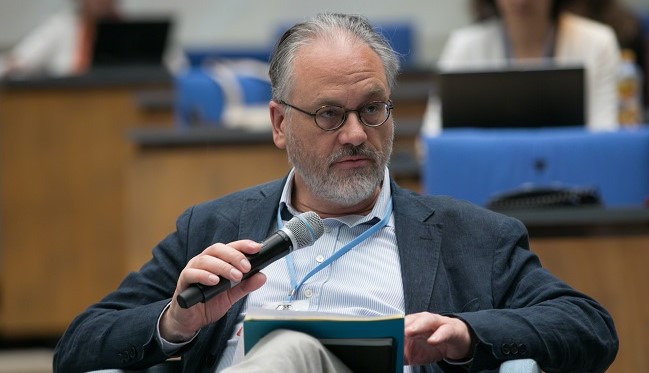The Chair of the United Nations Framework Convention on Climate Change (UNFCCC) Subsidiary Body for Scientific and Technological Advice (SBSTA) has released a Reflections Note in advance of SBSTA’s 50th session, providing information on the status of work on SBSTA agenda items and proposed organisation of work.

SBSTA 50 will take place in Bonn, Germany, from June 17 to 27, 2019, alongside the 50th session of the Subsidiary Body for Implementation (SBI).
In his note, SBSTA Chair, Paul Watkinson, reflects on the 50th anniversary of SBSTA. Citing SBSTA’s heavy workload and numerous mandated events, he notes that most agenda items will be referred to contact groups or informal consultations with a June 26 deadline to complete their work. He encourages Parties to keep contact group meetings and informal consultations open to observers, wherever possible.
On the Nairobi work programme on impacts, vulnerability and adaptation to climate change (NWP), Watkinson welcomes guidance from Parties to enhance the NWP’s role as a knowledge-for-action hub for adaptation and resilience in light of the Paris Agreement on climate change.
On terms of reference (ToR) for the 2019 review of the Warsaw International Mechanism for Loss and Damage associated with Climate Change Impacts (WIM), which will be considered jointly with SBI, the SBSTA Chair urges Parties to finalise the ToR to enable the review to take place at SB 51 in Santiago, Chile, in December 2019.
Regarding the Koronivia joint work on agriculture, to be considered jointly with SBI, the note explains that two workshops will address: methods and approaches for assessing adaptation, adaptation co-benefits and resilience; and improved soil carbon, health and fertility under grassland and cropland as well as integrated systems, including water management. Watkinson notes that SBSTA 50 will consider a proposal from New Zealand to host a workshop related to the Koronivia road map.
On research and systematic observation, the SBSTA Chair highlights that SBSTA 50 will address:
- transformation of energy and other sectoral systems to achieve the purpose and long-term goals of the Paris Agreement;
- transformative adaptation and climate-resilient development;
- changing levels of risk and the attribution of extreme climate events and impacts to climate change; and
- the role of the ocean in the climate system.
On matters relating to the forum on the impact of the implementation of response measures, considered jointly with SBI, the note explains that the first meeting of the Katowice Committee of Experts on the Impacts of the Implementation of Response Measures (KCI) will convene from June 13 to 14, 2019. Watkinson notes that the forum is expected to develop and recommend a six-year workplan.
Regarding methodological issues under the Paris Agreement, which constitutes a new mandate for SBSTA, the proposed organisation of work aims to manage all of the methodological issues while also addressing specific characteristics of five distinct but closely related sub-items, which SBSTA 50 will initiate substantive work on. Watkinson suggests that Parties consider the organisation of work in the lead-up to 2020, including intersessional work.
The note details remaining work to reach a substantive decision on specific paragraphs of Paris Agreement Article 6 (cooperative approaches), namely on guidance on cooperative approaches; rules, modalities and procedures for the mechanism established by Article 6; and the work programme under the framework for non-market approaches. Watkinson calls for SBSTA 50 to make progress on these issues so that operational guidance for Article 6 can be adopted at the 25th session of the Conference of the Parties (COP 25) in Santiago.
SBSTA 50 will also review Article 6-related issues such as environmental integrity, governance, infrastructure, corresponding adjustments, transition, overall mitigation in global emissions and share of proceeds. The SBSTA Chair suggests that Parties consider the usefulness of intersessional work before Santiago to advance progress.
On cooperation with other international organisations, the SBSTA Chair indicates that “it would be helpful to give it greater visibility” in light of “intense activity on climate change in the wider UN system,” including the in-depth review of SDG 13 (climate action) at the High-level Political Forum on Sustainable Development (HLPF) in July, the UN Secretary General’s Climate Action Summit on 23 September 23, 2019 and the SDG Summit, to be held from September 24 to 25.
Watkinson also highlights other related events and publications, including: the first meeting of the Facilitative Working Group (FWG) of the Local Communities and Indigenous Peoples Platform (LCIPP); the Intergovernmental Panel on Climate Change’s (IPCC) 2019 Refinement to the 2006 IPCC Guidelines for National Greenhouse Gas (GHG) Inventories, which is relevant in the context of common reporting tables; and the Intergovernmental Science-Policy Platform on Biodiversity and Ecosystem Services (IPBES) Summary for Policymakers (SPM) of the Global Assessment Report on Biodiversity and Ecosystem Services.
By Leila Mead, Thematic Expert for Climate Change and Sustainable Energy (US)
